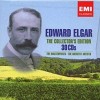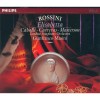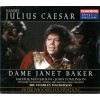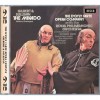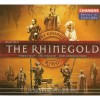| Voice/Instrument: | Soprano |
Biography
Margaret Valerie Masterson (born 3 June 1937), is a retired English opera singer, a lecturer and Vice-President of British Youth Opera. After study in Italy, she began to sing opera in Europe. Returning to England, Masterson performed as principal soprano with the D'Oyly Carte Opera Company from 1964 to 1969, becoming popular with audiences and participating in several of the company's recordings, as well as those of Gilbert and Sullivan for All and the BBC.
She next joined English National Opera and went on to an international opera career lasting more than three decades. Although she performed a wide variety of roles, she was best known for her roles in the French repertoire and the works of Handel, as well as Gilbert and Sullivan. Her recordings include, in addition to many opera roles, operettas and musical theatre. She has been awarded a CBE and is a Fellow of the Royal College of Music.
Masterson was born in Birkenhead, Cheshire, England, and studied at the Matthay School of Music in Liverpool and the Royal College of Music. She received good reviews for her student performances. The Times commented on her "welcome freshness", though on another occasion it found fault with her attempt at a Scottish accent in a Robert Burns evening at the Wigmore Hall, calling it "more of Kensington than Kilmarnock". Nevertheless, the paper judged her "good to listen to" and "intelligent".
She studied for a year in Milan with the soprano Adelaide Saraceni, but her most important teacher was the tenor Eduardo Asquez. She made her debut as Frasquita in Bizet's Carmen in Salzburg with the Landestheatre Opera Company, where she spent a season in 1963 singing roles in Italian, French and German operas. The following year, she returned to England, performing in concerts, including two Promenade Concerts with Sir Malcolm Sargent. She later recalled, "I remember Sir Malcolm Sargent plucking me out of the Royal College of Music to do some Proms as a student – can you imagine that happening nowadays? – and saying to me 'Your quiet singing will make your fortune'". The music critics commended "a team of soloists led by a newcomer, Miss Valerie Masterson, with particularly pure and radiant soprano tone" in the Serenade to Music.
Masterson joined the D'Oyly Carte Opera Company as a principal soprano in 1964. After a performance as Mabel in The Pirates of Penzance, The Guardian commented, "It is Valerie Masterson's Mabel that makes one revise ideas on D'Oyly Carte standards. It is a long time since the company had so strong a soprano lead." Other critics agreed: The Times criticised D'Oyly Carte vocal standards in 1968 but called Masterson and Kenneth Sandford "shining exceptions." She remained with D'Oyly Carte for five years, where her major roles were Mabel; Josephine in H.M.S. Pinafore; Phyllis in Iolanthe; Lady Psyche, and subsequently the title role, in Princess Ida; Yum-Yum in The Mikado; Elsie Maynard in The Yeomen of the Guard; and Casilda in The Gondoliers. She appeared in the company's film version of The Mikado as Yum-Yum in 1967. She left the company in 1969 but often returned for guest appearances.
Masterson went on to become principal soprano with English National Opera, from 1971, singing a wide range of roles from Mozart to Wagner and Rossini to Puccini. Her successes there included Adéle in Rossini's Le comte Ory, Violetta in La traviata and the title role in Massenet's Manon ("exquisitely sung and acted"). She made her French debut at Toulouse in 1975 as Manon, and then for three seasons beginning in 1975, at the Aix-en-Provence Festival, she sang a variety of roles, including "a memorable Matilde in Elisabetta, regina d'Inghilterra". She also sang in Strasbourg (Pamina), Rouen (Countess, Marriage of Figaro), and returned to Toulouse (Violetta).
There followed starring roles at the Royal Opera House, Covent Garden, and, over a career lasting more than 30 years, in major opera houses around the world. Her repertory extended from the earliest operas to late 20th century works. For the Paris Opera she sang Drusilla in Monteverdi's 1642 work, The Coronation of Poppea. At Covent Garden she created the role of May in Hans Werner Henze's 1976 premiere of We Come to the River, and sang The Anne who Steals in Aulis Sallinen's 1984 opera The King Goes Forth to France, at the UK premiere on 1 April 1987.
Her many other roles included Gilda in Rigoletto, Pamina in The Magic Flute, Susanna and the Countess in The Marriage of Figaro, Constanza in The Seraglio, Sophie and the Marschallin in Der Rosenkavalier, Mimì in La bohème, Micaëla in Carmen, Adèle in Le comte Ory, Woglinde and the Woodbird in the Ring and Madame Lidoine in Dialogues des Carmélites, of which The Times wrote that Masterson "makes a sound so beautiful one wishes it could go on for ever.... Life offers few pleasures like that of hearing Felicity Lott and Valerie Masterson singing on the same stage". She has also sung roles in Così fan tutte, Don Giovanni, Idomeneo, The Merry Widow and Lucia di Lammermoor, among others. She appeared at the Prague National Theatre as the Countess in Le Nozze di Figaro. She performed for two seasons at Geneva, as Gilda in 1981 and Mireille later that year. Masterson (singing Gilda) was a member of the English National Opera company that toured five cities in the U.S. in May and June 1984.
Masterson played a significant part in the reintroduction of Handel's operas to the mainstream repertoire. Her purity of line and facility for ornamentation, coupled with excellent diction, helped to bring to life his works which, as recently as the 1960s, were considered unperformable. In 1983, Masterson won a Laurence Olivier Award for her performance in the title role of Semele at Covent Garden. Her other Handel roles included Romilda in Xerxes for ENO, Cleopatra in Giulio Cesare opposite Janet Baker for ENO and later for Houston Grand Opera and San Francisco Opera, Berenice in Scipio for the Handel Opera Society at Sadler's Wells, and Morgana in Alcina at Aix en Provence. On the concert platform she sang the Queen of Sheba in Solomon.
Some of her greatest successes were in the French repertoire, in roles including Manon, Marguerite in Gounod's Faust, in London and Paris, Juliet in Romeo and Juliet, in London and internationally, Leila in The Pearl Fishers, and the title role in Louise. Of her Manon for ENO, The Times commented, "The Coliseum has found a worthy successor to Elizabeth Harwood in the delectable form of Valerie Masterson, who has here her greatest success to date with the company. She looks at once charming, fragile and seductive, and she sings with light insouciance and easy forward tone."
As a home-grown British soprano with a charming personality and attractive appearance, Masterson became popular with wider British audiences through frequent contributions to the popular radio series Friday Night is Music Night and the TV programme The Good Old Days. She also participated in television broadcasts of several Gilbert and Sullivan operas and live relays from English National Opera.
As Vice-President (and former president) of British Youth Opera, Masterson continues to work with young singers. In 1989, Masterson was made a CBE in the Queen's birthday honours. She was also made a Fellow of the Royal College of Music in 1992.
Masterson also continues to give master-classes and to lecture about singing and her career. She often speaks at the annual International Gilbert and Sullivan Festival in Buxton, England, and performed Yum-Yum in The Mikado at that festival in 1997. She is a Patron of the Carl Rosa Opera Company. An avid sportswoman and cooking enthusiast, she is married to former D'Oyly Carte principal flautist Andrew March.






